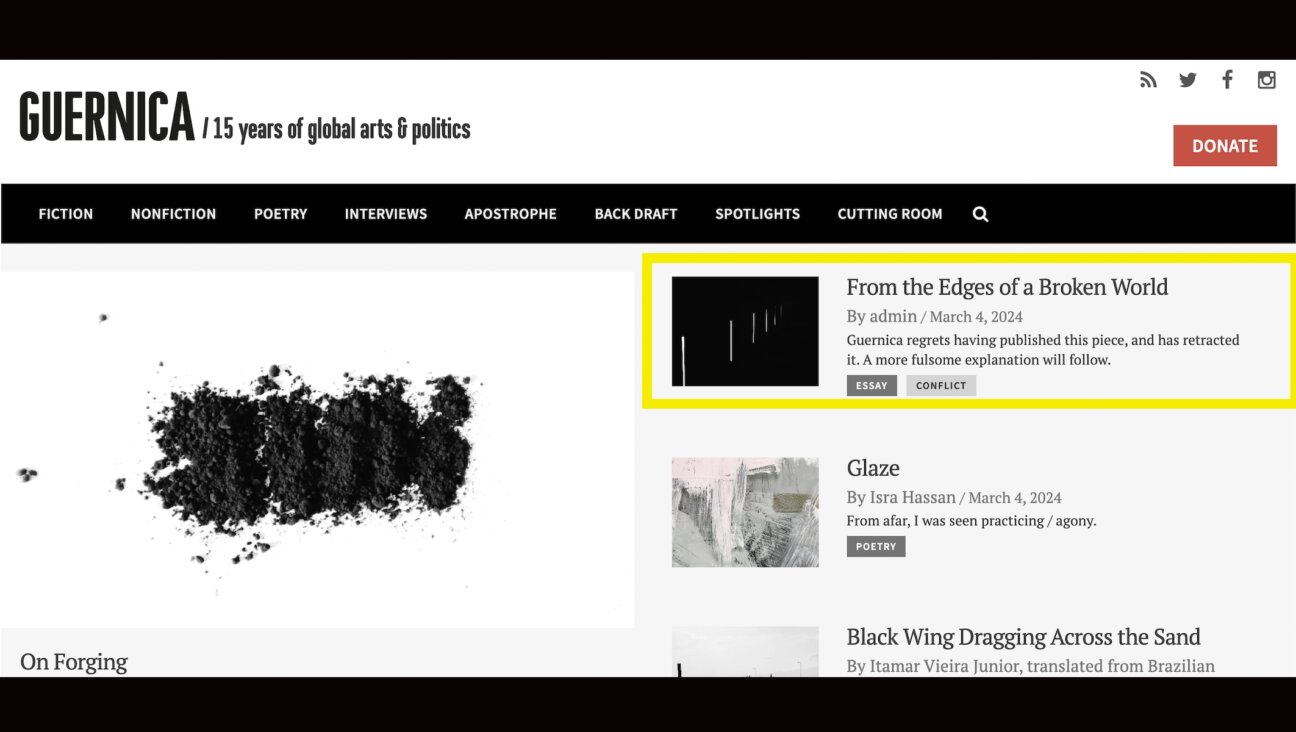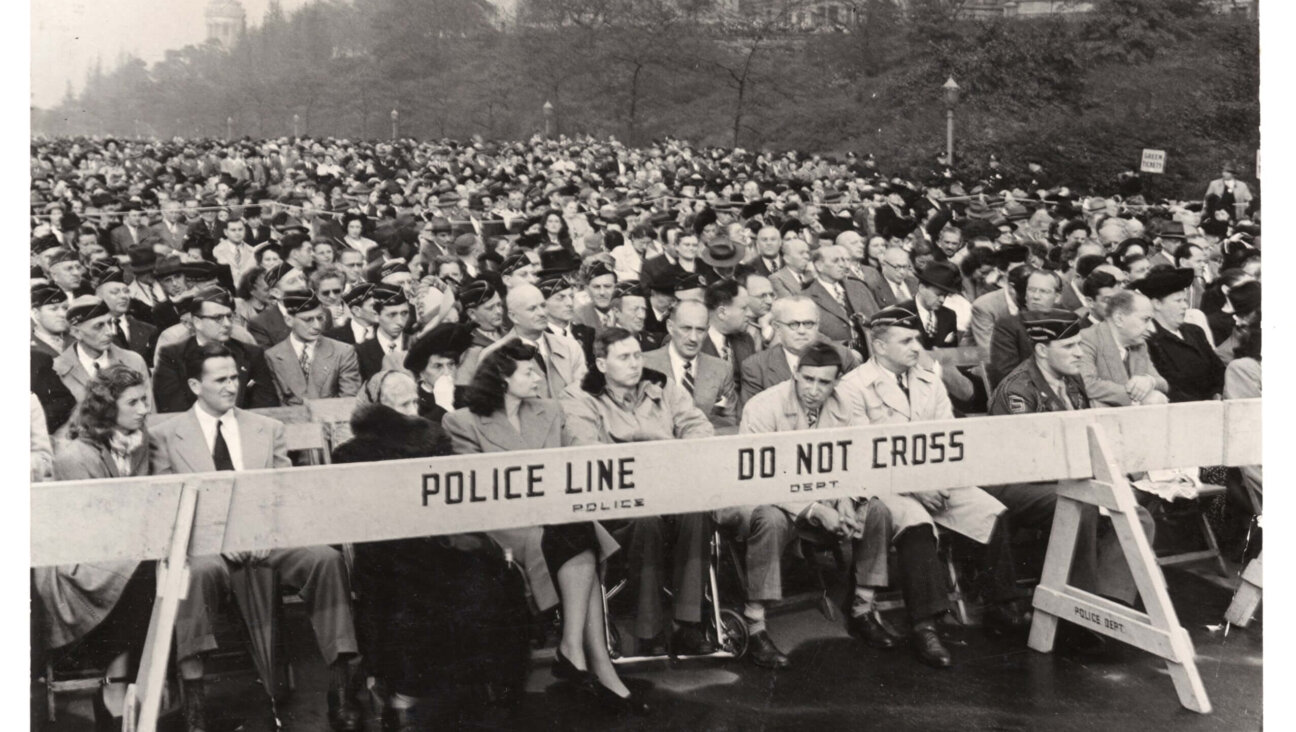Treating J Street With a Little Respect
What happens when candor collides with civility? These days, discussions of contentious subjects routinely begin with a caution: We should be civil in our disagreements. But if we are to be courteous and respectful toward those with whom we disagree, how do we avoid lapsing into the anemia of political correctness?
Respect? I am happy to acknowledge my own fallibility. I am intensely interested in views different from my own when they come from well-informed people who in turn acknowledge the concerns that I express. I’ve had such exchanges regarding torture, abortion, capital punishment, Israel’s security requirements. But respect the view that Israel should hold on to all the West Bank, come what may? To my way of thinking, that is a proposal that Israel commit suicide — and I have no respect for those who promote suicide.
Candor: Our community’s current obsession with civility, led by the Jewish Council for Public Affairs and its president (and my friend), Rabbi Steve Gutow, seems to have come about in significant part, as a response to the sheer ugliness of the debate regarding J Street. The disgraceful effort to characterize J Street as ”anti-Israel“ or as ”pro-Arab“ has found sufficient traction to become a seriously divisive force in communities across the country. One is surely entitled to disagree, even vehemently, with J Street’s strategy and tactics. But anti-Israel? That is nonsense, pure and simple.
But it is nonsense with traction. In synagogues across the country, any suggestion that J Street be given a respectful hearing or be included in a forum on what it means to be “pro-Israel” is likely to be vehemently attacked — nay, assaulted.
So here’s the question: How can so many people have accepted such an absurd and abusive a reading of what J Street is about?
We now have some evidence of how this works. The evidence comes from Boston, which until a decisive incident in late May had appeared to be as intemperately divided over J Street as any community in the country. But it turns out that the division was hardly a 50-50 split. It was, instead, the product of a group of militant J Street antagonists large enough and fervent enough to poison conversation, yet, as it turns out, small enough to qualify as tiny. This we now know because of a special meeting of the Jewish Community Relations Council of Greater Boston convened to consider, among other things, whether J Street should retain its membership on the council or be expelled from it. In the prolonged and passionate run-up to the meeting, there was no way of confidently predicting its outcome. There was ample speculation that the 70 or so qualified voters would split at about 40 against 30. But when, after a full debate, the votes were counted, the decisively lopsided result was 57–9 to affirm J Street’s membership. It seems that all the noise that had so distracted the community for more than two years was now the product of a belligerent handful of malcontents confronting a largely silent majority.
In pressing for a vote of record, that small minority succeeded in arousing that silent majority, and when it came time for them to speak, they convincingly repudiated J Street’s denigrators. (During the debate, no one spoke more eloquently or passionately to the value of inclusiveness than Barry Shrage, president of Boston’s Combined Jewish Philanthropies, thereby putting to bed the perception that the Jewish establishment is inevitably the narrow-minded mouthpiece of a right-wing cabal.)
One is now entitled to hope that the Boston experience will serve as a precedent in other communities and that we will find more serious things to argue about — civilly, of course. This is not a First Amendment question. It is a question of our capacity to distinguish between allies and enemies. It is a question of how we choose to define “pro-Israel.” It is, in the end, a question of honesty.
Sometimes, it appears, civility and candor cannot be reconciled. It is now time to put the J Street debate to rest and not to argue, in the name of courtesy or a kindred virtue that it remain an open question. It is, please excuse me, time to disrespect those who vilify J Street.

I hope you appreciated this article. Before you go, I’d like to ask you to please support the Forward’s award-winning journalism this Passover.
In this age of misinformation, our work is needed like never before. We report on the news that matters most to American Jews, driven by truth, not ideology.
At a time when newsrooms are closing or cutting back, the Forward has removed its paywall. That means for the first time in our 126-year history, Forward journalism is free to everyone, everywhere. With an ongoing war, rising antisemitism, and a flood of disinformation that may affect the upcoming election, we believe that free and open access to Jewish journalism is imperative.
Readers like you make it all possible. Right now, we’re in the middle of our Passover Pledge Drive and we need 500 people to step up and make a gift to sustain our trustworthy, independent journalism.
Make a gift of any size and become a Forward member today. You’ll support our mission to tell the American Jewish story fully and fairly.
— Rachel Fishman Feddersen, Publisher and CEO
Join our mission to tell the Jewish story fully and fairly.
Our Goal: 500 gifts during our Passover Pledge Drive!
























